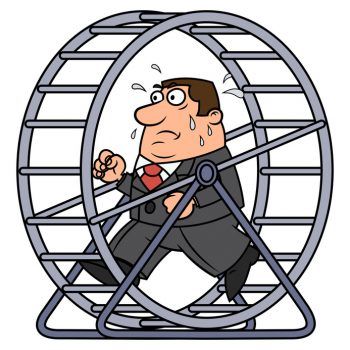
This blog picks up on a theme we raised in our Product Management Journal Take Control: Putting product management in the driving seat – which is that we believe
Product managers should be leaders within their business.
Do you spend your time fixing things, answering the same old questions and going round in circles like a hamster on a wheel?
It is common advice given to board members, in-particular CEOs and Managing Directors, to “Work on the Business, not in the Business”. A Product Manager is often referred to as a “mini-CEO” or “CEO of the Product” and funnily enough, this advice transfers well.
This advice is really about ensuring you work on the right things. CEOs and Product Managers are both leaders. Their role is to be looking to the horizon for the opportunities and challenges that will be encountered. They must plot a course and steer the organization, or product team, not put-their-head-down to do the work and just react as things happen.
Looking at many start-ups the CEO is the Product Manager. And when you look at larger businesses what are they other than loosely coupled portfolios of products and services? So in a corporate sense, the CEO is simply looking after a larger portfolio of products and keeping a larger group of stakeholders happy.
Because Product Managers own the product cradle-to-grave and think of it as their “baby” they often spend a lot of their time doing tactical work in the Product … “because no one else can or will”.
As the Product Manager, your job is NOT…
- to build the product, coding it yourself
- to answer all the support calls about the product
- to write the user documentation
- to create and execute the marketing campaign
As the Product Manager, your job IS…
- to ensure that development know what to build and that what they deliver fulfills the market need
- to ensure that the support function is in place and capable of answering the calls
- to ensure the documentation is created, says what it needs to and is available
- to ensure there is a suitable marketing campaign that targets your chosen customers with the right messages
There are a hundred other examples I could cite here, but I hope the point comes through. As the Product Manager, your job is to direct and orchestrate not to do all the little things that are needed to deliver.
Now the reality check. If you’re in a small business without many resources or even a small part of a larger business without many resources, there will be times when you have to take on some (or all) of these tactical activities otherwise your product may fail.
BUT every time you do so, ask yourself “Who should have been doing this?” and “Why couldn’t or didn’t they do it?”. Work out a plan to make sure that it’s handled the right way next time around. Often it’s a case of empowering people and at other times it comes down to simple information sharing.
Some of you will now be thinking “but if I don’t do any of these tactical things then why does the company need me?”.
The truth is that if you are the only person who can handle certain things related to a product you will have a degree of job security … for as long as that product is relevant. But no product lasts forever. And when the next generation comes along to replace it the company may have someone else driving it because you are “too busy” looking after the legacy product.
Plus the next Product Manager will more than likely be tasked to ensure that all these activities are handled by the broader organization because it’s more scalable and less risky for the business.
On the other hand, if you have enabled the organization to handle all of these things then you have proved your value and will have the bandwidth to be able to drive the next generation forward. In fact, if you are a good Product Manager you will be the one driving the strategy to replace the current generation having identified what is needed next.
My advice to Product Managers is to enable and empower others so that they can work IN the product then you are free to work ON the product and the future.
If you enjoyed this blog, you might find others here of interest.
Phil Hornby
Independent Consultant


Join the conversation - 2 replies
I’d love to be able to agree with this article and say that this matches my experiences. Being in a small company, Product Management is the jack-of-all-trades that does the tasks that no-one else does. Engineering engineers, sales sell, marketing does corporate marketing, customer support supports. Product fills in the cracks / gaping chasms between where one business function stops and the next one starts.
Apart from pleading for more resource, I dream of only working on the product and not in it!
Hi Arthur, sorry for the delayed response I only just spotted your comment, better late than never!
Your sentiment is intriguing, you clearly want the opportunity to work on not in the products you are responsible for and for the different functions to take full responsibility for their areas but find you have to plug the gaps. I wonder how often are those gaps really things that other people should be doing? Having to support sales demos because sales can’t do it themselves, write copy because marketing aren’t clear on the message or answering support calls because customer support weren’t able to handle a particular query? I know in my experience this is a common issue. This is what I mean, if you have to repeat the same thing twice like this then it is time to put the extra effort in to enable people to do it themselves in future so you don’t have to.
Yes product often has to fill the gaps but often those gaps actually should be done by someone else they just aren’t able to, with a little effort product can often enable them to do those things in the future. There are challenges in small organisations, and large, but the goal is to strive to work on not in. I am not claiming it is easy to achieve but if you just accept that you will work within the product then you are missing an opportunity to work strategically which to my mind is where a product manager can add the most value.